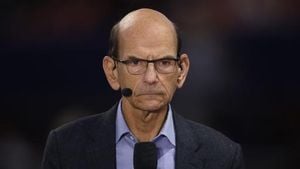It’s been a turbulent week for Britain’s Labour Party, with the annual conference in Liverpool laying bare simmering tensions, policy confusion, and the challenges of facing both internal dissent and a resurgent political rival. From Greater Manchester Mayor Andy Burnham’s outspoken critiques to Labour MPs’ muddled approach on gambling taxes and climate policy, the party’s leadership finds itself at a crossroads—struggling to present a unified vision while fending off both external and internal threats.
At the heart of the drama was Andy Burnham, the charismatic “King of the North,” whose presence at the conference was impossible to ignore. According to The i Paper, Burnham appeared at no fewer than nine events, and his popularity among the party’s grassroots remains robust. Yet, his renewed criticism of Labour leader Sir Keir Starmer and the Prime Minister’s direction of the party ruffled feathers at the top. During a fringe meeting on September 29, 2025, Burnham accused Downing Street of fostering a “climate of fear” and stifling open debate. He called on Starmer to “put more big ideas on the table” and “tell a story about this country,” lamenting what he saw as a “narrow, factional way of running the party.”
Despite his protestations that he is not seeking the leadership—citing his lack of a seat in Parliament—Burnham’s refusal to rule out private approaches from MPs and his ambiguous stance on completing his mayoral term only fueled speculation. “You would have to wrench me out of Manchester,” he mused, leaving the door ajar for future possibilities.
Burnham’s policy suggestions were as bold as his rhetoric. He urged Labour to consider land value taxation targeting the wealthiest landowners and a revaluation of council tax, but he pushed back against introducing digital ID at this time. Yet, he was quick to insist, perhaps in a sign of retreat, that Starmer remained “the best person for the job of Prime Minister.” Still, the undercurrent of rivalry was unmistakable, with party insiders interpreting Burnham’s maneuvers as a thinly veiled leadership pitch.
Labour’s leadership, however, is in no mood to indulge such ambitions. Senior figures made clear that any attempt by Burnham to re-enter Westminster would be blocked by the National Executive Committee (NEC), dominated by Starmer loyalists. “The NEC will just block his selection,” one Cabinet minister told The i Paper. “Even if they didn’t, he then has to win a by-election and there is no guarantee of that... then he has to try and unseat Keir. I think what he’s doing is nuts. He’s launching a leadership bid for a job that doesn’t exist.”
Others in Labour’s ranks were equally blunt. One MP remarked, “The NEC will block any attempt by him to get a seat. The party won’t want a by-election right now... He committed to the mayoralty for its full term. Who would we get in that has the same presence and could win a by-election for the mayoralty?”
Yet, some warn that blocking Burnham could backfire, alienating the party’s base and painting the leadership as insecure. “I can’t see an NEC stitch-up against Andy, it would be such an admission of weakness from No 10,” another Labour MP cautioned. Burnham’s supporters note that if his ally Lucy Powell were to secure the deputy leadership, she could facilitate his return via the NEC.
Meanwhile, Burnham’s team has reportedly eyed potential seats, such as those held by Andrew Gwynne and Marie Rimmer, though no vacancies have materialized. For his part, Burnham insists his intent is to “stimulate a debate about the direction of the party,” not to undermine Starmer. “I’m speaking out for millions of good people around Britain who want a more hopeful direction for the country,” he declared, to a standing ovation at a voting reform event.
Polling suggests that Burnham’s appeal is more than just noise. A YouGov survey for Sky News found that 62 percent of Labour members would back Burnham over Starmer in a leadership contest, with only 29 percent supporting the Prime Minister. As one insider observed, “Andy has done us all a favour. Because until now we’ve not really had much opposition, and so Reform have sort of filled the vacuum. And now we’ve got some internal opposition—it helps focus everyone.”
Yet, the party’s headaches aren’t limited to leadership squabbles. The rise of Reform UK loomed over the conference, with Labour MPs brainstorming strategies to fend off Nigel Farage’s insurgent party. Jo White, MP for Bassetlaw and founder of the Red Wall Caucus, called for tangible climate policy benefits—specifically, fitting solar panels to “pensioner bungalows” and expanding grants for heat pumps and solar panels to middle-income earners. “What I want to see is solar panels on pensioner bungalows and see those pensioners advocating for retrofitting,” White told a fringe meeting, as reported by the BBC. She argued that the failure to lower energy bills, despite Energy Secretary Ed Miliband’s pledge of £300 annual savings by 2030, was fueling climate skepticism and driving voters toward Reform UK.
White also highlighted the growing threat of misinformation, noting that her constituents were increasingly turning away from mainstream journalism and being “sucked into matching YouTube rather than mainstream media.” She called on Labour to build a rival ecosystem of influencers and social media channels to counter the far right’s dominance online, suggesting that showcasing successful left-wing policies could help win back trust.
While Labour struggles for clarity on climate and energy, confusion reigns in another policy arena: gambling taxes. On September 25, over 100 Labour MPs signed a letter to Chancellor Rachel Reeves urging a gambling tax hike to fund the abolition of the two-child benefit cap. Yet, as the Racing Post pointed out, the letter conflated online gambling with land-based betting shops and adult gaming centres, muddling the policy’s intent and impact. Some signatories, such as Dr Allison Gardner—whose constituency’s largest private employer is gambling giant bet365—were accused of overlooking local realities. The MPs’ letter also misrepresented revenue figures and international comparisons, while failing to acknowledge the government’s new statutory levy expected to raise £100 million annually for problem gambling research and treatment.
These missteps have not gone unnoticed. Critics warn that indiscriminate tax hikes could devastate the gambling sector, with knock-on effects for British horseracing and associated jobs. At the same time, the government’s new powers to let local councils control the proliferation of betting shops add another layer of complexity, as communities weigh the social and economic trade-offs.
As Labour’s conference drew to a close, the party was left to reflect on a week of soul-searching and strategic recalibration. Whether it’s Burnham’s challenge, the fight against Reform UK, or the tangled web of gambling and climate policy, the party faces tough choices ahead. The coming months will test Starmer’s ability to forge unity, articulate a compelling vision, and deliver the tangible benefits voters crave. For now, the only certainty is that the debate over Labour’s future is far from settled.




